
Latest News Regarding
Horn of Africa
DP World and Somaliland open new terminal at Berbera Port
DP World and Somaliland open new terminal at Berbera Port
Source: Michele Labrut | Jun 28, 2021
Photo: DP World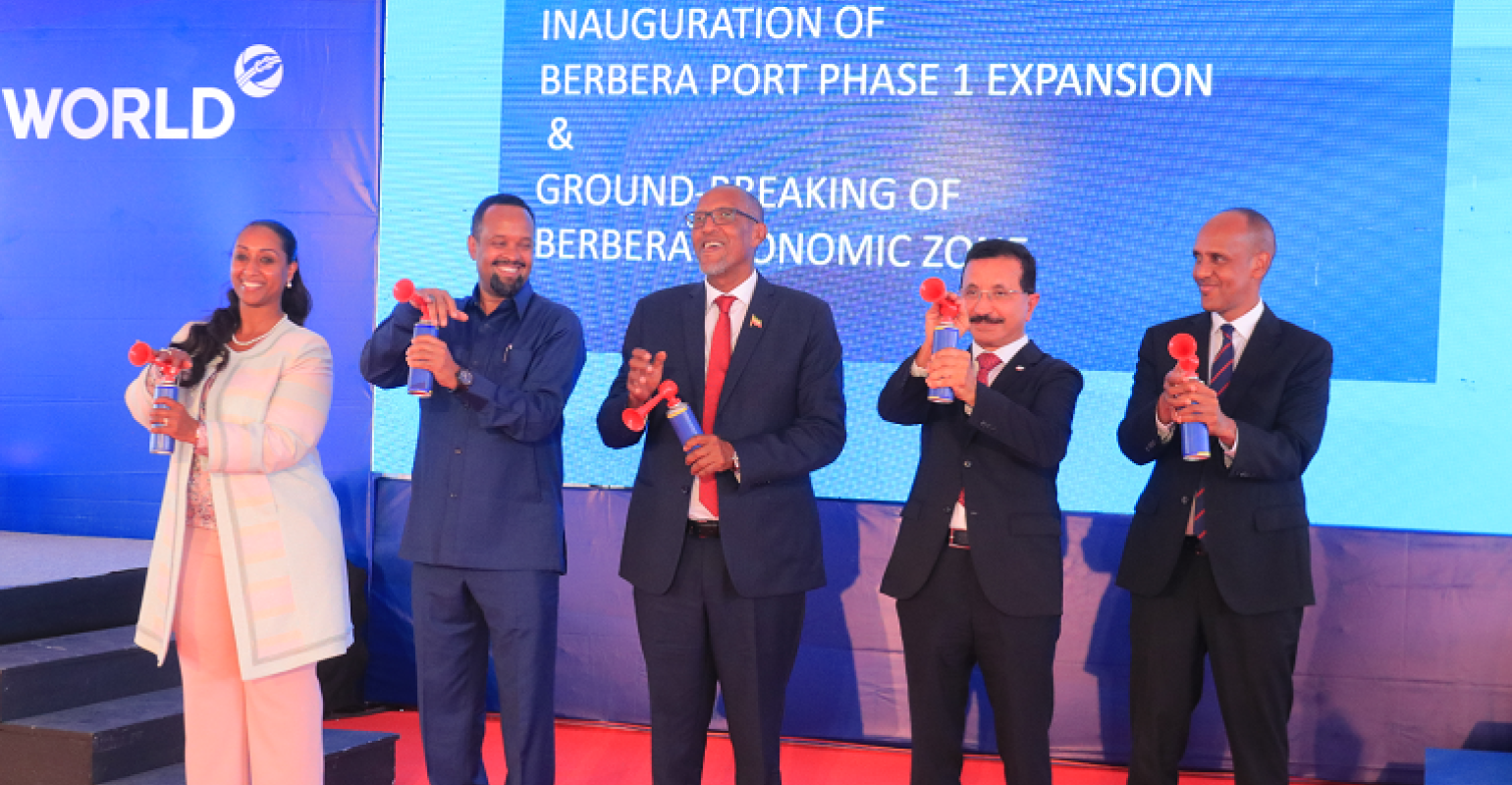 DP World and the Government of Somaliland, have inaugurated the new container terminal at Berbera Port, following completion of the first phase of the port’s expansion.
DP World and the Government of Somaliland, have inaugurated the new container terminal at Berbera Port, following completion of the first phase of the port’s expansion.
Michele Labrut | Jun 28, 2021
The new terminal was officially opened by the President of Somaliland, Muse Bihi Abdi, and Sultan Ahmed bin Sulayem, Group Chairman and CEO of DP World and included a symbolic ground-breaking for the new Berbera Economic Zone, the first phase of which is under construction.
The new container terminal, with a draught of 17m, a quay of 400m and three STS-gantry cranes, can handle the largest container vessels in operation today and increases the port’s annual capacity from 150,000 teu to 500,000 teu.
Related: DP World changes UAE leadership
The terminal also includes a modern container yard with eight gantry cranes (RTGs). A new port One Stop Service Centre is also currently being built and will be ready in the third quarter of this year.
DP World has committed to investing up to $442m to develop and expand Berbera Port, and Sultan bin Sulayem announced that work is already underway to further expand the port in a second phase. This includes extending the new quay from 400 metres to 1,000 metres, and installing a further seven STS gantry cranes, increasing the total from three to 10, enabling the port to handle up to 2m teu and simultaneously multiple large container vessels.
Related: DP World expands European inland network with three French ports
The economic zone, strategically located, is linked to the port and will serve as a centre of trade with the aim to attract investments. It will target a range of industries, including warehousing, logistics, traders, manufacturers, and other related sectors.
“This is a proud and historic moment for Somaliland and its people, as the completion of the first phase has made our vision of establishing Berbera into a major trade hub in the region a reality. With the new terminal, along with the second phase of expansion and economic zone along the Berbera corridor, we are now firmly positioned to further develop and grow our economy through increased trade, attracting foreign direct investment and creating jobs,” said President Muse Bihi Abdi.
“Our further expansion of the port in a second phase, and its integration with the special economic zone we are developing along the Berbera Corridor, reflects our confidence in Berbera and intent to develop it into a significant, world-class centre of trade. It will be a viable, efficient and competitive option for trade in the region, especially for Ethiopian transit cargo,” commented Sultan Ahmed Bin Sulayem.
DP World Berbera, which began operations at the port in March 2017, has since increased volumes by 35% and vessel productivity by 300%, and reduced container vessel waiting time from four to five days, to only a few hours.
Copyright © 2021. All rights reserved. Seatrade, a trading name of Informa Markets (UK) Limited.TAGS: TERMINAL OPERATORSMIDDLE EAST & AFRICADP WORLD
Somalia: Cash and business skills training support to women-headed businesses
Somalia: Cash and business skills training support to women-headed businesses




Source: ICRC, Monday June 28, 2021
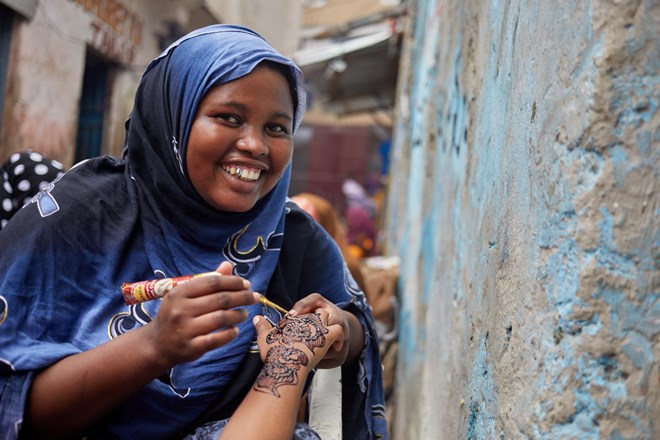
Faduma Ahmed is a self-taught henna artist in Mogadishu. She is a single mother with one child, and her money allows her to support her family. “I am pleased and delighted to see my customers leave my salon feeling beautiful and smiling,” she says. ICRC/Ismail Taaxta
Today marks the International Day of Micro, Small and Medium Enterprises (MSMEs). Small businesses led by women and young entrepreneurs continue to face the pandemic’s wrath economically. Lockdown measures implemented to prevent the spread of the COVID-19 virus have wreaked havoc on supply chains and resulted in a significant drop in the demand for goods.
Through micro-economic initiatives, the ICRC supports vulnerable low-income families to start, restart or expand existing small businesses that can contribute to their family income, ultimately leading to an improved and sustainable livelihood.
In Somalia, the main micro-economic initiative being implemented is focused on cash support combined with training on business skills that targets vulnerable women-headed households. More than 200 women business owners in Mogadishu received USD 500 dollars and training to improve their businesses this year.
We feature six women-led businesses in Hamar Weyne, Mogadishu city.
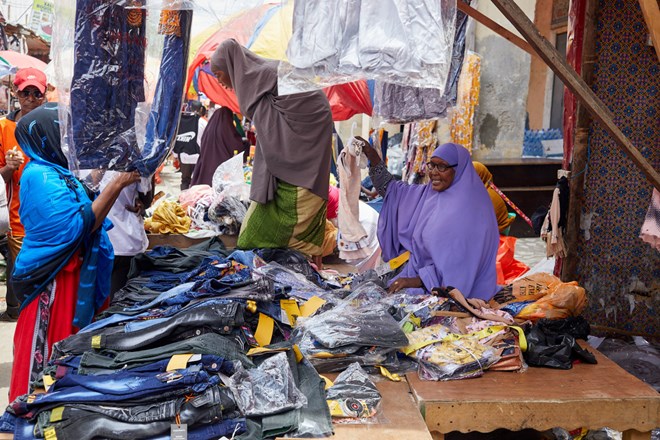
Asli Salad has been selling clothes in Mogadishu for more than 20 years. Number of buyers have dwindled since the onset of the COVID-19 pandemic. After receiving USD 500 from the ICRC, she has stocked up more clothes and used the remaining money to support her 10 children. ICRC/Ismail Taaxta
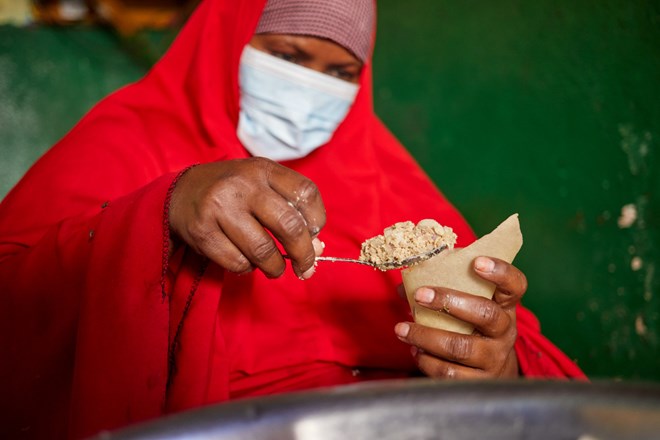
Duniyo Mohamed Ahmed, 36, has owned a café in Mogadishu for the past seven years, where she prepares Somali cuisine meals. “Before the pandemic, the restaurant was always packed for breakfast and lunch. ICRC/Ismail Taaxta.”
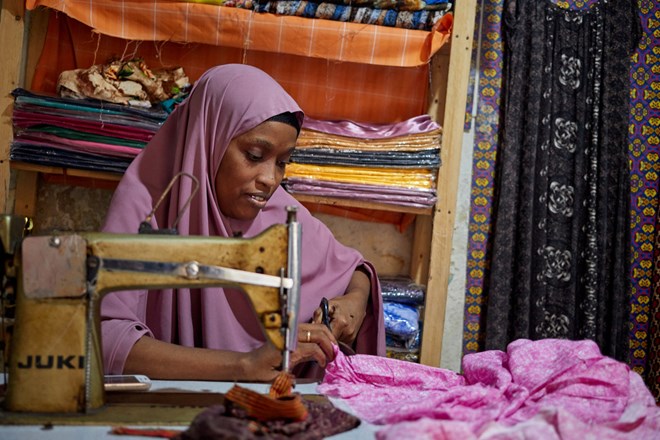
Maryan Abukar Haji is Hamar Weyne’s only female tailor and her specialty is designing and sewing women clothing. She has also benefitted from cash and business skills training. ICRC/Ismail Taaxta
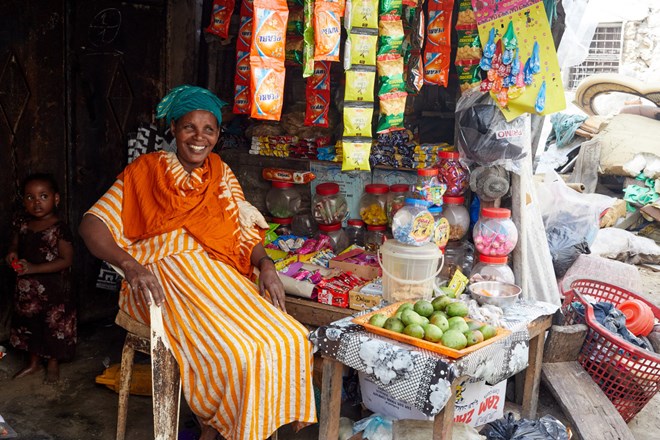
Ebla Mukhtar Guhad has been running her retail shop for the past 30 years. She sells mangoes and bananas, as well as milk, cold drinks, balloons and candy. Her husband runs a laundry business, and the two are raising their seven children with both their income. ICRC/Ismail Taaxta.
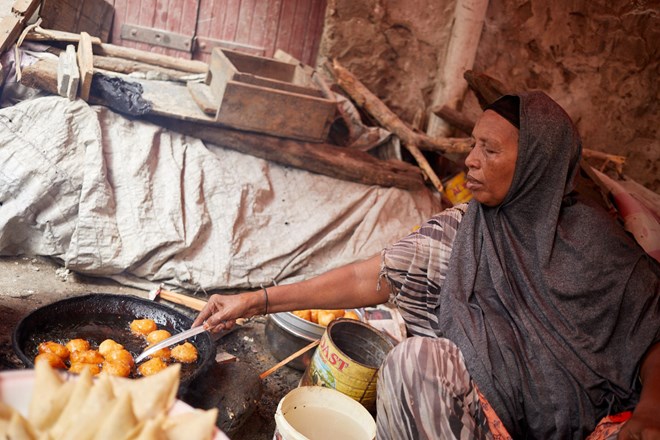
Faduma Mohamed Abdirahman has been in the baking business for 30 years now. Every day at 6:00 a.m., she opens her café to cook the pastries. Early mornings and late afternoons are her busiest hours, as Somalis enjoy their pastries with Shaah – a cup of hot spicy tea. ICRC/Ismail Taaxta.
Somali leaders meet today in Mogadishu to finalise election process
Somali leaders meet today in Mogadishu to finalise election process



Source: Hiiraan, Monday June 28, 2021
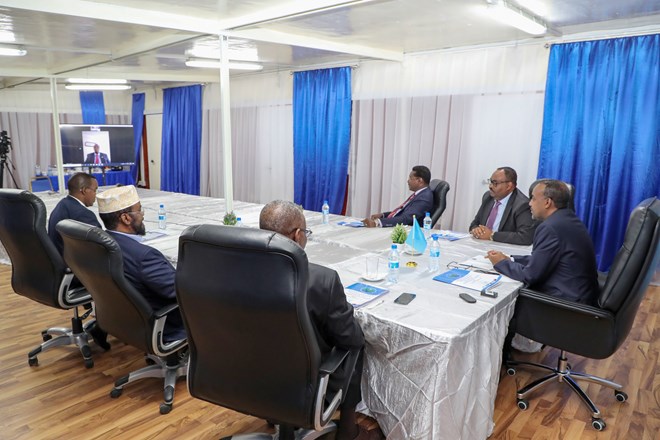
MOGADISHU (HOL) – Prime Minister Mohamed Roble and Federal Member State leaders are meeting today in Mogadishu for another round of talks and are expected to settle remaining issues ahead of the elections.
advertisements
The meeting which was to start on Saturday will kick off today. Virtually all FMS leaders have in the last three days arrived in Mogadishu.
The talks which are a first since the signing of the electoral agreement on May 27 are expected to formulate and adopt an elections schedule, approve the recently released security plan and set a framework for the selection of clan elders and delegates.
The May 27 Agreement states that clan elders together with civil society organisations will work with regional governments in the selection of the delegates who will in turn elect the 275 MPs.
The list of the clan elders will however need to be updated first to cater for replacements in case of deaths of respective elders and other considerations.
The Security Plan released by the Office of the Prime Minister last week assigns the Somali Police Force, UN Police and AMISOM security of the elections.
Meanwhile, HirShabelle president has changed his mind and will be attending the talks after he indicated Sunday he will be keeping off.
The OPM said in a tweet today Gudlawe who is in Turkey apologized for his earlier decision and that he will be attending the talks through ZOOM.
Importance of Context in Ethiopia’s Crisis
Importance of Context in Ethiopia’s Crisis
Source: The Stockholm International Peace Research Institute published on 18 June 2021 an analysis titled “Ethiopia’s Crisis Runs Deeper than Tigray” by Jason Mosley.
The conflict in Tigray Region is part of a broader political crisis in Ethiopia. External pressure on Ethiopian officials to de-escalate the conflict in Tigray and expand humanitarian access, without reference to the broader context, risks exacerbating the factors driving the conflict in Tigray.

Labels: Amhara militia, EFFORT, elections, EPRDF, Eritrea, Ethiopia, EU, humanitarian crisis, Oromo Liberation Army, Prosperity Party, Tigray Defense Forces, Tigray Region, TPLF, UK, US
The Sudan-Ethiopia Border Dispute
The Sudan-Ethiopia Border Dispute
Source: The International Crisis Group (ICG) published on 24 June 2021 an analysis titled “Containing the Volatile Sudan-Ethiopia Border Dispute.”
Ethiopia and Sudan are locked in a dangerous military standoff over a piece of fertile borderland farmed by Ethiopian farmers but claimed by Sudan. External partners should urge the two countries to find a land-use compromise similar to an earlier soft border arrangement without linking the issue to other contentious issues.

Labels: Abdalla Hamdok, Abiy Ahmed, Amhara Region, AU, borders, Eritrea, Ethiopia, EU, GERD, land use, Meles Zenawi, Omar al-Bashir, Rapid Support Forces, Sudan, Tigray Region, TPLF, UAE, US
Grave violations against children in conflict ‘alarmingly high’, latest UN report reveals
Grave violations against children in conflict ‘alarmingly high’, latest UN report reveals




Source: UN News Centre, Tuesday June 22, 2021
More than 19,300 boys and girls affected by war last year were victims of grave violations such as recruitment or rape, and the COVID-19 pandemic made it difficult for experts to reach them, the UN said in its annual report on Children and Armed Conflict (CAAC), published on Monday.
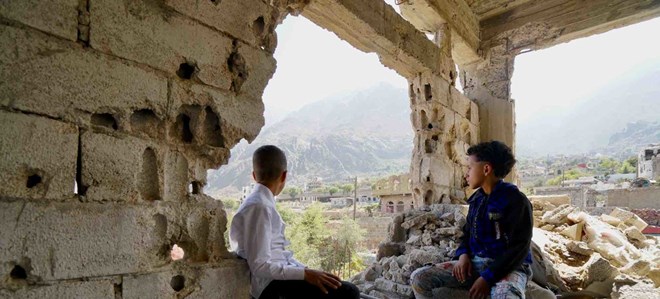
Two children, who recently returned home after they and their family fled fighting in 2017, look out over the Al Gamalia neighborhood of Taiz City. UNOCHA/Giles Clarke
Grave violations against children remained “alarmingly high” at nearly 26,500, while the pandemic increased their vulnerability to abduction, recruitment and sexual violence, as well as attacks on schools and hospitals.
‘A stolen childhood’
Measures to curtail coronavirus spread, also complicated the work of UN child protection monitors and experts, according to the report which is entitled A Stolen Childhood and a Future to Repair: Vulnerability of Girls & Boys in Armed Conflict Exacerbated by COVID-19 Pandemic.
“The wars of adults have taken away the childhood of millions of boys and girls again in 2020. This is completely devastating for them, but also for the entire communities they live in, and destroys chances for a sustainable peace”, said Virginia Gamba, the Secretary-General’s Special Representative on CAAC. advertisements
Recruitment and use, as well as killing and maiming of children, were the most prevalent violations in 2020, followed by denial of humanitarian access and abduction, the report said.
Abductions, attacks on girls’ education
More than 8,400 youngsters were killed or maimed in ongoing wars in Afghanistan, Syria, Yemen, and Somalia, while nearly 7,000 more were recruited and used in fighting, mainly in the Democratic Republic of the Congo, Somalia, Syria and Myanmar.
Researchers reported “exponential growth” in abductions, which rose by a staggering 90 per cent last year. Rape and other forms of sexual violence also shot up by 70 per cent.
Meanwhile, attacks on schools and hospitals “remained excessively high”, which included serious attacks perpetrated against girls’ education and against health facilities and personnel. There was also an increase in the military use of schools, as the temporary closure of schools during the pandemic made them easy targets for military occupation and use.
The report further revealed that girls made up a quarter of all child victims of grave violations. They also were mostly affected by rape and other forms of sexual violence, comprising 98 per cent of victims, followed by killing and maiming.
“If boys and girls experience conflict differently and require interventions to better address their specific needs, what the data also showed is that conflict doesn’t differentiate based on gender,” Ms. Gamba stated.
Progress and commitments
Despite the sobering statistics, the report also details tangible progress in dialogues with warring parties in Afghanistan, the Central African Republic, Nigeria, the Philippines, South Sudan and Syria.
Some 35 new commitments or other engagement were reached last year to better protect children, including two new action plans signed in Myanmar and South Sudan.
Additionally, armed groups and forces freed more than 12,643 children from their ranks following UN engagement, and many more boys and girls were spared from recruitment due to age screening processes in situations where the UN has action plans with governments to stop child recruitment and use.
The report stated, however, that progress has taken place as child protection capacities on the ground are both overstretched and underfunded.
Promote peace, child rights and democracy
Ms. Gamba praised teams working in the field throughout the pandemic, and in challenging environments.
She underlined the need to secure resources for child protection at a time of extreme suffering for children, given the many setbacks in democratic processes at the beginning of this year, and the rise in violence between warring sides.
“This is an opportunity to stop and reflect on the suffering we are causing our children, who are our future,” the senior UN official said.
“We need to give children an alternative to violence and abuse: we need peace, respect for child rights and democracy. We need hope in good governance. We need to act to build a future where peace prevails. Please, give children that alternative.”
Ethiopia votes in test for PM Abiy amid reports of abuses
Ethiopia votes in test for PM Abiy amid reports of abuses1




Source: AP, Tuesday June 22, 2021
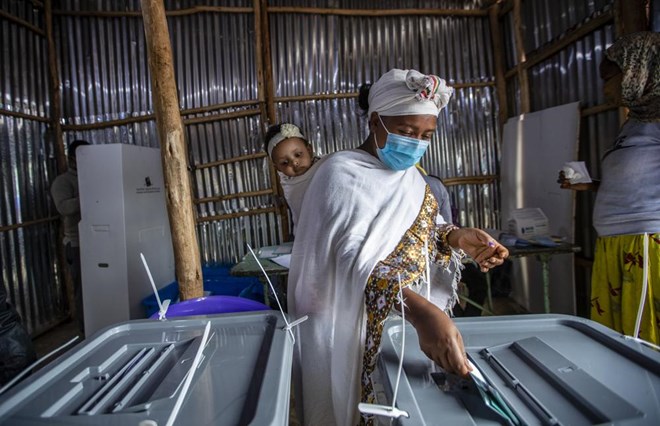
A mother carries her baby on her back as she casts her vote in the general election at a polling center near Entoto Park on the outskirts of the capital Addis Ababa, Ethiopia Monday, June 21, 2021. Ethiopia began voting Monday in the greatest electoral test yet for Prime Minister Abiy Ahmed as war and logistical issues meant ballots wouldn’t be cast in more than 100 of the 547 constituencies across the country. (AP Photo/Ben Curtis)
ADDIS ABABA, Ethiopia (AP) — Ethiopians voted Monday in a major test for Prime Minister Abiy Ahmed, whose rise to power initially seemed to signal a break with decades of authoritarian rule but who has since waged war in the Tigray region and whose party has been accused of election abuses.
The parliamentary election, delayed from last year, is the centerpiece of the promised reform drive by Abiy, the 2019 Nobel Peace Prize winner, and he has described the poll as “the nation’s first attempt at free and fair elections.”
But international concern has been growing about the vote, and opposition groups have accused Ethiopia’s ruling party of harassment, manipulation and threats of violence that echo abuses of the past. One opposition leader still said he hoped the election would come off with only minor problems, but some prominent opposition parties are boycotting the election, notably in the country’s most populous region, Oromia. Others say they were prevented from campaigning in several parts of the country.advertisements
In more than 100 of the country’s 547 constituencies, polls are not even open — either because of the ongoing war in the northern Tigray region or logistical issues elsewhere. No date has been set for voting in Tigray’s 38 constituencies. The rest will vote in September — and the next government likely won’t be formed until that happens.
Abiy, whose party is widely expected to cement its hold on power, is also facing growing international criticism over the war in Tigray, sparked in part because the region’s now-fugitive leaders objected to Ethiopia postponing the election last year amid the COVID-19 pandemic.
On Monday, long lines of voters were seen in some parts of the capital, Addis Ababa, while security was stepped up across Africa’s second-most populous country. Military vehicles were parked in key locations in the capital. More than 37 million Ethiopians were expected to vote, and one noted the wide range of candidates running.
“Last time we didn’t have a choice, but this is totally different,” Girmachew Asfaw said.
But another resident of the capital, who gave only his first name, Samuel, said he wouldn’t be voting. “Two or three years ago I would have voted for Abiy, but now there are a lot of troubles in our country,” he said.
Abiy’s ruling Prosperity Party, formed in 2019 by merging groups that made up the previous ruling coalition, registered 2,432 candidates in the election. The next largest party, Ethiopian Citizens for Social Justice, was fielding 1,385 candidates. A total of 47 parties were seeking seats. Final election results from Monday’s voting are expected within 10 days.
The spirit of this election “is much better in many ways than the previous elections,” Abiy said Monday, adding that the country is “witnessing the atmosphere of democracy.”
But opposition groups sounded warnings of election day harassment.
Opposition candidate Berhanu Nega with the Ethiopian Citizens for Social Justice party told reporters that his party had recorded more than 200 instances of its election observers being “kicked out” of polling stations or denied access. He said he hoped the troubles “do not reflect the whole process.”
Getnet Worku, secretary general of the opposition ENAT party, accused Prosperity Party members of campaigning inside polling booths and said five of his party’s agents were detained for several hours, calling it “a matter of intimidation.”
Ethiopia’s election chief, Birtukan Midekssa, told reporters that some election-related problems had been witnessed in the Amhara, Afar and Southern regions with some observers having difficulty in moving around and doing their job, which she called “concerning.” Some opposition candidates also are having trouble moving around, and “this may cause a problem in the election process and its result, so it has to stop immediately.”
Birtukan earlier had acknowledged “serious challenges” but noted that more parties and candidates are contesting than ever before. “I call on the international community to support Ethiopia on its democratic journey, stressful and imperfect though it is,” she wrote in the U.S.-based magazine The National Interest.
Tigray’s former leaders, who are fighting Ethiopian forces and those from neighboring Eritrea, have reported fierce new combat in recent days. Abiy’s government and the regional one each view the other as illegitimate, and the war broke out late last year, after Abiy accused the region’s forces of attacking a military base.
Ethiopia’s defense forces have called recent fighting challenging because of the rough terrain. Thousands of civilians have been killed and famine has begun as observers warn that the conflict is becoming a drawn-out guerrilla war.
Meanwhile, outbreaks of ethnic violence have killed hundreds of people in the Amhara, Oromia and Benishangul-Gumuz regions in recent months.
“We need a government that brings us peace, unity and that will stop the killing everywhere, and we also need to be pulled out from these ethnic divisions,” voter Desalgn Shume said.
International concern has been growing about the election. The U.S. has said it is “gravely concerned about the environment under which these upcoming elections are to be held,” and the European Union said it will not observe the vote after its requests to import communications equipment were denied.
In response, Ethiopia said external observers “are neither essential nor necessary to certify the credibility of an election,” although it has since welcomed observers deployed by the African Union.
The United Nations secretary-general has noted the “challenging” environment and warned against acts of violence.
Somaliland women need loans to support their small businesses
Somaliland women need loans to support their small businesses




Source: radio ergo, Sunday June 20, 2021
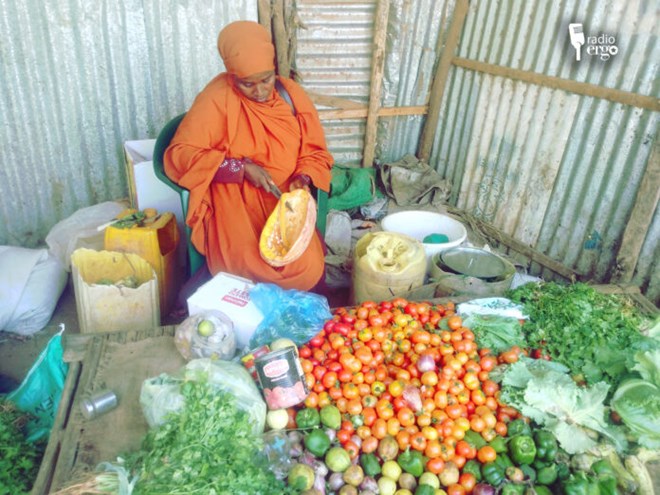
Basra Hussein Hersi, a mother of six, had to close her small shop last year in Gacan Libaax village, in the Somaliland capital Hargeisa, when she ran into losses.
“The little money I made from the shop daily was used to pay the family bills. I didn’t save any money for the continuity of the shop,” she said.
Nobody she knew could lend her any money. The banks in Somaliland offered minimum loans of $1,000 with repayment rates of at least $200 a month, which was an impossible target for her.
“I would have taken a loan from the bank if the repayment plan were $50 a month because I can afford that. My shop is not in the market, I sell here in the village, so $200 is a lot,” she said.
Basra and her family have been relying on her husband’s small income as a security guard and some support from Basra’s mother, who rented out two rooms to help her daughter and grandchildren after the shop closed last October.
They had to move to her brother’s house in December after she and her husband failed to pay their rent.
advertisements
A study published in June by charity Oxfam found that prohibitive bank loan requirements are a major factor in the collapse of small businesses in Somaliland. Most businesses are run by women, who provide for their families from their income. But as well as the high rates, the local banks prefer to lend money to men rather than women.
The researchers interviewed 144 women in Hargeisa, Burao and Borama, whose small businesses closed last year due to financial problems. All but five of them said that they had wanted a loan but the bank charges were unaffordable.
Nimo Ali Ahmed, a mother of 11, provided for her family selling goat meat. She used to slaughter two goats a day to sell in her neighbourhood but was forced to shut down after the price of goats rose to two million Somaliland shillings ($230).
Nimo learnt about bank loans in May after a friend of hers took a loan. She is now contemplating applying for a loan herself to restart her business.
“I have never taken a bank loan, but I am thinking of trying it now. The process is long, and I am not too sure if I will be lucky enough to get it,” she said.
Oxfam’s head of communications and media, Abdiaziz Ali Adani, told Radio Ergo that the lack of investment opportunities for small businesses has exacerbated poverty as women are mostly the sole breadwinners of their families in Somalia.
“Most women prefer the rotating group savings scheme over bank loans. They are easier to access as you can join the group and contribute money. Some groups collect as little as $10,” he said.
Abdiaziz urged the banks to lower their interest rates on loans and to ease the application requirements so that more women can turn to bank loans when their businesses are failing and need investment.
Why Ethiopia’s 2021 Elections Matter
Why Ethiopia’s 2021 Elections Matter
Source: The US Institute of Peace published on 17 June 2021 an analysis titled “Why Ethiopia’s 2021 Elections Matter” by Aly Verjee and Terence Lyons.
There are serious questions whether the 21 June elections in Ethiopia will advance democratization or lead to further political polarization. At least 76 of the 547 constituencies will not be voting.

Labels: Abiy Ahmed, elections, Ethiopia, Ezema, Harar, NAMA, parliament, Prosperity Party, Somali Region, Tigray Region
Ethiopia’s Upcoming Election
Ethiopia’s Upcoming Election
Source: The International Crisis Group (ICG) published on 17 June 2021 a Q and A titled “Ethiopia Votes, But Balloting Will Not Ease the Country’s Deep Crisis” with William Davison, ICG senior analyst for Ethiopia.
This is a wide ranging discussion of Ethiopia’s parliamentary elections scheduled for most parts of the country on 21 June.

Labels: Abiy Ahmed, elections, Ethiopia, Ezema, national dialogue, National Movement of Amhara, OLF, Oromia, Oromo Federalist Congress, Prosperity Party, Tigray Region, TPLF
Podcast on Ethiopia’s 21 June Election
Podcast on Ethiopia’s 21 June Election
Source, The International Crisis Group (ICG) posted on 16 June 2021 a 34-minute podcast titled “Ethiopia’s Rocky Transitional Election” with William Davison, ICG’s senior analyst for Ethiopia.
Ethiopia is holding parliamentary elections on 21 June. Violent flare-ups in parts of the country, a poll boycott by some opposition political parties, and postponed votes in several locations cast a shadow over the election.

Labels: Abiy Ahmed, Amhara Region, Benishangul-Gumuz, elections, EPRDF, ethnic nationalism, GERD, national dialogue, Oromia, parliament, political parties, Prosperity Party, Somali Region, Tigray Region, US
Ethiopia Rejects Arab League Call for UN Security Council Meeting on Dam
Ethiopia Rejects Arab League Call for UN Security Council Meeting on Dam
Source: Reuters published on 15 June 2021 an article titled “Arab States Call on U.N. Security Council to Meet over Ethiopian Dam.”
An Arab League meeting in Qatar on 15 June passed a resolution calling on Ethiopia to negotiate “in good faith” with Egypt and Sudan and asked the UN Security Council to take up the issue of the Grand Ethiopian Renaissance Dam (GERD).
Aljazeera published on 16 June 2021 an article titled “Ethiopia Rejects Arab League Resolution on Renaissance Dam.”
Ethiopia responded that the GERD is an African issue that can only be resolved in the spirit of finding African solutions to African problems.

UN chief Guterres sworn in for second term, vows to learn from pandemic
UN chief Guterres sworn in for second term, vows to learn from pandemic




Source: AFP, Friday June 18, 2021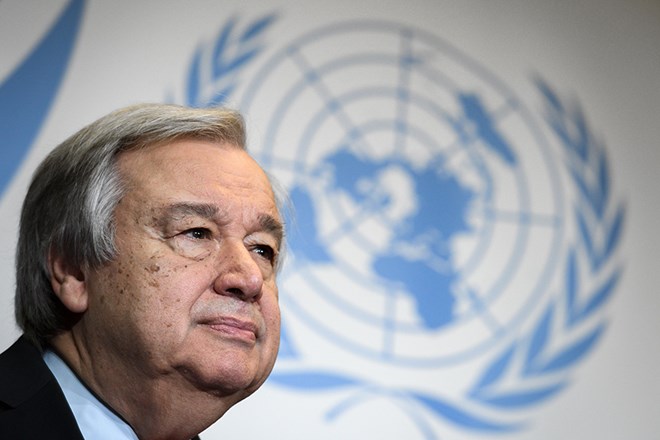
UN Secretary-General António Guterres speaks at a news briefing after presenting his disarmament agenda at a conference at the University of Geneva on May 24, 2018 in Geneva. (Photo: Fabrice Coffrini/AFP/Getty Images)
UN Secretary-General Antonio Guterres was sworn in Friday for a second term as head of the world body, promising to draw on the lessons of the deadly Covid-19 pandemic.
“Our greatest challenge — and which is at the same time our greatest opportunity — is to use this crisis to turn the tide, pivot towards a world that learns lessons,” the former Portuguese prime minister said as the General Assembly re-appointed him for the 2022-2016 term.advertisements
This, Guterres added, would include promoting a “just, green and sustainable recovery” which shows the way forward “through increased and effective international cooperation to address global issues.”
In office since 2017, Guterres promised to act independently of member states and organizations during the swearing-in ceremony attended by Portuguese President Marcelo Rebelo de Sousa, the first head of state to set foot in the United Nations building for more than a year because of the pandemic.
Guterres added that it would be essential to “make prevention and preparedness — in the broad sense of the words — a top priority in the international system.”
Speaking at a press conference after the ceremony, Guterres reiterated that “from the many lessons that we learned, the most important lesson is that alone we can do nothing. The most important lesson is that we need to rebuild solidarity and trust.”
US Secretary of State Antony Blinken congratulated Guterres saying his country looked forward to “continuing our strong and constructive relationship” with the secretary-general.
Global issues “require a collaborative, effective, and results-oriented leader in the United Nations secretariat, and we have that in Antonio Guterres,” Blinken added.
The 193-member General Assembly had approved a resolution extending Guterres’ five-year term, rather than taking a vote.
The UN Security Council, at a crucial stage in the nomination process, gave its blessing on June 8 to the reappointment of the 72-year-old, who had previously served as UN High Commissioner for Refugees between 2005 and 2015.
Environmentalists: Demand for Somali Charcoal Fueling Desertification, Drought
Environmentalists: Demand for Somali Charcoal Fueling Desertification, Drought




Source: VOA, By Mohamed Kahiye
Friday June 18, 2021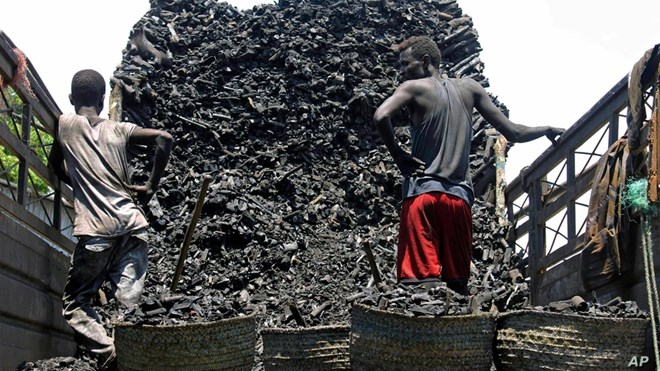
Somali porters offload charcoal from a truck at a charcoal market in Mogadishu, Oct. 30, 2012.
MOGADISHU – Environmentalists are warning that the demand for charcoal in Somalia is fueling desertification and drought.
The U.N. Convention to Combat Desertification, known as UNCCD, says an estimated 8.2 million trees were cut down for charcoal in Somalia between 2011 and 2017, increasing land degradation, food insecurity, and vulnerability to flooding and drought.
Dr. Abdullahi Emi Mohamed, an expert on the environment, water and climate change, said several parts of the country are experiencing climate-related shocks because of the unprecedented deforestation rate in the past three decades.advertisements
“In many parts of the Hiran and Middle Shabelle region, that is the places we have seen major flooding because of the low capacity of the river channel to carry a large amount of water, and that has clear co-relations with the number of trees,” he said. “Because when the tree is cut, it will be easy for the soil to erode, which ends up into the river. So all these connections can be explained — that the people have cut down the large number of trees that could have sustained the life of the rural people and their animals.”
U.N. Security Council Resolution 2036, adopted in 2012, banned the export of charcoal from Somalia.
Although significant amounts of the charcoal still find their way to the gulf states, the relative peace and stability experienced in Somalia and lifestyle changes are forcing some families — mainly diaspora returnees — to abandon the use of charcoal and firewood.
“Previously, people used to use a lot of charcoal in the city, but as time has passed, people have resorted to using gas because the security has improved,” said gas user Ikram Farah. “And then there is the availability of cooking gas everywhere in towns, so it is much easier to use the gas than the charcoal, because the gas is faster and there is no smoke. And it is safe for the environment, and no more trees are cut.”
UNCCD said countries across the globe are expected to recover 1 billion hectares of land by 2030. The U.N. program’s executive secretary, Ibrahim Thiaw, said his organization helps promote sustainable land management to protect the climate from overuse of land that results in drought.
A spokesperson for Somali Prime Minister Mohamed Ibrahim Moalimu reiterated that cutting down trees for commercial purposes in the country is illegal and urged citizens to preserve the remaining forest cover.
Somali premier appoints committee to probe missing recruits
Somali premier appoints committee to probe missing recruits




Source: AA, Sunday June 13, 2021
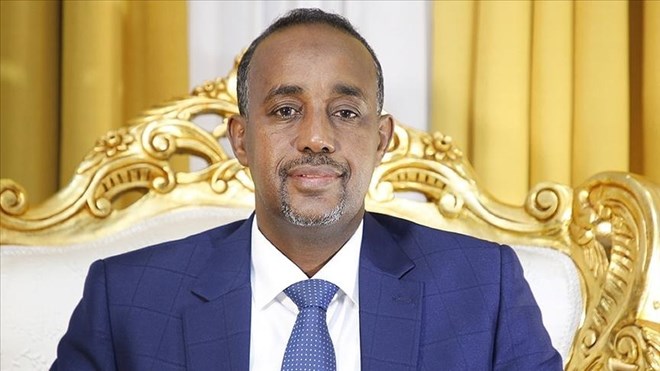
Prime Minister Mohamed Hussein Roble appointed a high-level government commission of inquiry on Saturday to investigate complaints by Somali parents who have not heard from their sons who went to Eritrea.
Ads By GoogleDefense chief Hassan Hussein Haji, Interior Minister Mukhtar Hussein Afrah and Army Chief of Staff Odawa Yusuf Rageh are among those selected to be on the commission.
Somali parents have been protesting in Mogadishu for the past two days, demanding information and to know the whereabouts of their sons.
A UN human rights report, citing credible information, reported that Somali cadets in Eritrea crossed the Eritrean border alongside Eritrean troops to fight in the Tigray region.
Somalia denied reports of Somali troops fighting in the war-torn region.
Anadolu Agency spoke to several parents who are suffering from a lack of information about their sons but some confirmed that they spoke to their children through government communication channels and also via direct telephone calls.
Opposition Wins Somaliland Parliamentary Elections
Opposition Wins Somaliland Parliamentary Elections
Source: Reuters published on 6 June 2021 an article titled “Somaliland Opposition Win Majority in First Parliamentary Vote since 2005.”
Somaliland opposition political parties–WADDANI and Justice and Welfare–respectively won 31 and 21 parliamentary seats in the 82-member chamber. The ruling Unity and Development Party won 30 seats. The two opposition parties said they would join forces. They also won a majority of the seats in municipal races. The next presidential vote is scheduled for 2022.

Labels: elections, Musa Bihi Abdi, parliament, political parties, Somaliland
Somaliland at a Crossroads
Somaliland at a Crossroads
Source: World Politics Review published on 8 June 2021 an analysis titled “Somaliland’s Moment of Reckoning” by Matthew Gordon, University of London.
The author argues that after 30 years of self-declared independence from Somalia but no international recognition, Somaliland is too well-established to ignore and its people are as devoted to self-determination as ever. The international community can choose to embrace this reality or maintain its hands-off approach.

Labels: AU, democracy, diplomatic recognition, governance, independence, Somalia, Somaliland, UAE
Somali parents take to streets over ‘missing’ army recruits
Somali parents take to streets over ‘missing’ army recruits




Source: AA, Thursday June 10, 2021
By Mohammed Dhaysane
Government denies Somali forces fighting in Ethiopia’s Tigray region
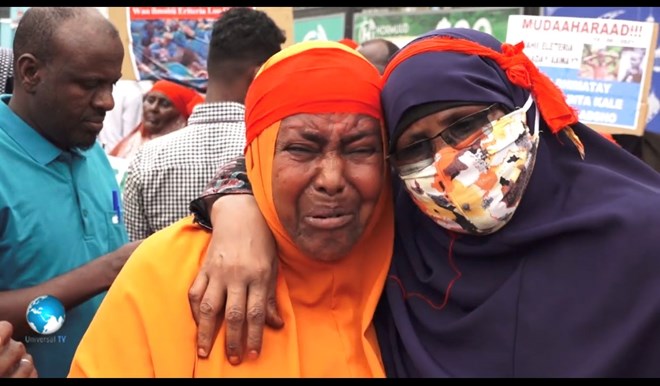
Somali parents Thursday staged a protest in the capital Mogadishu, demanding the government disclose the whereabouts of their sons who were taken to Eritrea for military training.
This fresh protest by the parents comes days after a UN human rights report, citing “credible sources”, said that Somali trainees have crossed to the Eritrean border along with the Eritrean forces to fight in Ethiopia’s conflict-hit Tigray region.Ads By GoogleBashir Sheikh Ali, the father of a recruit, told Anadolu Agency in Mogadishu they want the government to explain the recruiting process and the whereabout of their sons.
“Our son was very young and he was told that he was going to Qatar for training. He was told he will be paid well and become an army officer. But he was transferred to Eritrea. Since his departure, we never communicated with him,” Ali said.
“If the government does not have anything to hide, it should tell us if he is alive or dead,” he demanded.
Halima Abdi, one of the protesting parents, told Anadolu Agency that they will continue the protest to pressure the government.
“We are not against our government. We are patriotic citizens, but the way our leaders are behaving right now is unacceptable. We need full information about our sons,” Abdi said.
Some families confirmed they spoke to their sons through the government communication channels.
Somali government reiterates denial
The Somali government Thursday again strongly denied that its forces fought in Tigray region, but confirmed the presence of Somalian forces in Eritrea.
Somali Information Minister Osman Dubbe told a news conference in Mogadishu after the protests: “No Somali soldier is fighting in Tigray, no Somali soldier has been captured in Tigray, and no Somali soldier was in Axum.”
He said Eritrea is training the forces just like other friendly countries who are taking part in rebuilding and strengthening the Somali national army.
The minister accused the political opposition groups of politicizing the country’s defense and security matters.
“In many countries, politicians avoid discussing defense and security matters because it is deemed a supreme national secret. Unfortunately, our politicians have made the politicization of our forces a hobby which is dangerous,” he said.
Somalia’s Puntland moves to ban female genital mutilation
Somalia’s Puntland moves to ban female genital mutilation



Source: Reuters, Friday June 11, 2021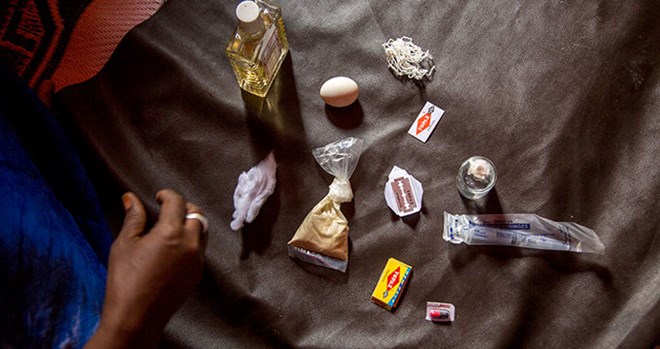
GAROWE, Somalia (Thomson Reuters Foundation) – Somalia’s semi-autonomous Puntland region has taken a first step towards banning female genital mutilation (FGM) in a country where almost all women and girls are forced to undergo the internationally condemned practice.
Puntland President Said Abdullahi Deni and his cabinet this week approved a bill to be submitted to parliament that would criminalise the ancient ritual, a measure anti-FGM campaigners said would boost their efforts to end the practice.“It will be forbidden to circumcise girls. Girls in Puntland must be left the way they are born. Anyone who performs circumcision in the region will face the full force of the law,” Puntland Justice Minister Awil Sheikh Hamud told reporters.
Justice Ministry officials said the bill includes stiff penalties for those who perform FGM, including hospitals, midwives and traditional circumcisers. No date has yet been set for it to be presented before parliament for a vote.
FGM, which involves the partial or total removal of the female genitalia, is almost universal in Somalia – with 98% of women and girls having been cut, according to the United Nations Population Fund (UNFPA).
There is currently no national law outlawing FGM in the Horn of Africa country.
Both Puntland and the breakaway state of Somaliland have issues fatwas – religious edicts – against the practice in the past, but there is no parliamentary legislation is in place.
FGM affects 200 million girls and women globally and can lead to a host of serious medical problems, according to the World Health Organization.
It can cause long-lasting mental and physical health problems including chronic infections, menstrual problems, infertility, pregnancy and childbirth complications. In some cases, girls can bleed to death or die from infections.
In many communities, girls are married soon after cutting, stifling their progress in education, health and employment.
School closures caused by the pandemic could lead to an extra two million girls being cut in the next decade, the UNFPA has estimated, hampering global efforts to stamp out the practice by 2030.
In Somalia, where the vaginal opening is also often sewn up – a practice called infibulation – charities have reported a surge in cases as circumcisers offer door-to-door services for girls stuck at home due to COVID-19 restrictions.
Campaigners said legislation banning FGM would boost their fight to end the practice.
Hailing it as a “great milestone”, the UNFPA’s head in Somalia, Anders Thomsen, said the bill would “have a ripple effect in the campaign to end FGM in Puntland” if approved.
“This means girls will be safe from the brutal cut,” he added in a statement.
Somali anti-FGM campaigner Maymun Mahad said she still remembered undergoing the “very painful” practice.
“As a young woman, I welcome the move by the cabinet,” she said.
Reporting by Mohammed Omer; Writing by Nita Bhalla @nitabhalla; Editing by Helen Popper.
Somali PM appoints team of seven to support his office in preparations for elections
Somali PM appoints team of seven to support his office in preparations for elections




Source: Hiiraan Online, Wednesday June 9, 2021
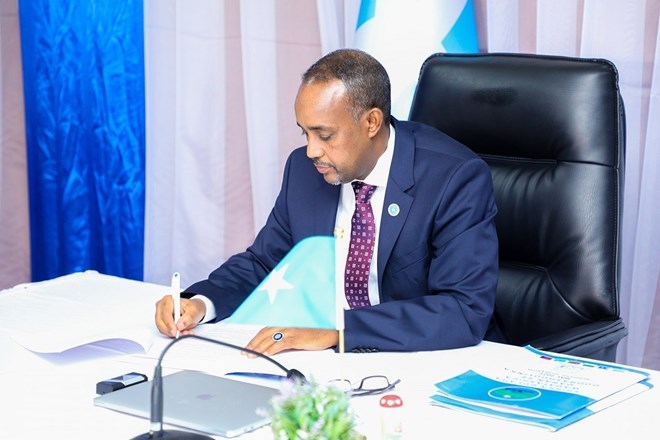
MOGADISHU (HOL) – A team of seven individuals will help Prime Minister Mohamed Roble in leading the preparations and conduct of elections set to happen in less than two months from now.
advertisements
The office of the Prime Minister announced Wednesday the appointment of the Elections Support Team which will be tasked with overseeing various aspects of the election such as elections, gender, outreach and legal issues among others.
The team will be headed by Abdulkadir Elmi Ali who will act as the chief coordinator of the support team.
Omar Mohamed Abdulle who chaired the 2016 Federal Indirect Elections Team (FIET) has been appointed as senior elections and legal advisor to the team.
Fadumo Ali will be in charge of finance and operations while Mohamed Mohamed Roble handles capacity building and training. Liban Rabila Good has been assigned the security aspect.
Others are Laila Abdirahman Mohamed (gender and inclusivity) and Abdullahi Hashi Hassan (civil society and engagement assignment).
The appointment of the team adds to a series of events in the lead up to the August 2021 elections.
The OPM last week removed 33 individuals from a list of 67 flagged by the opposition for removal from the federal and state level elections committees for unsuitability.

